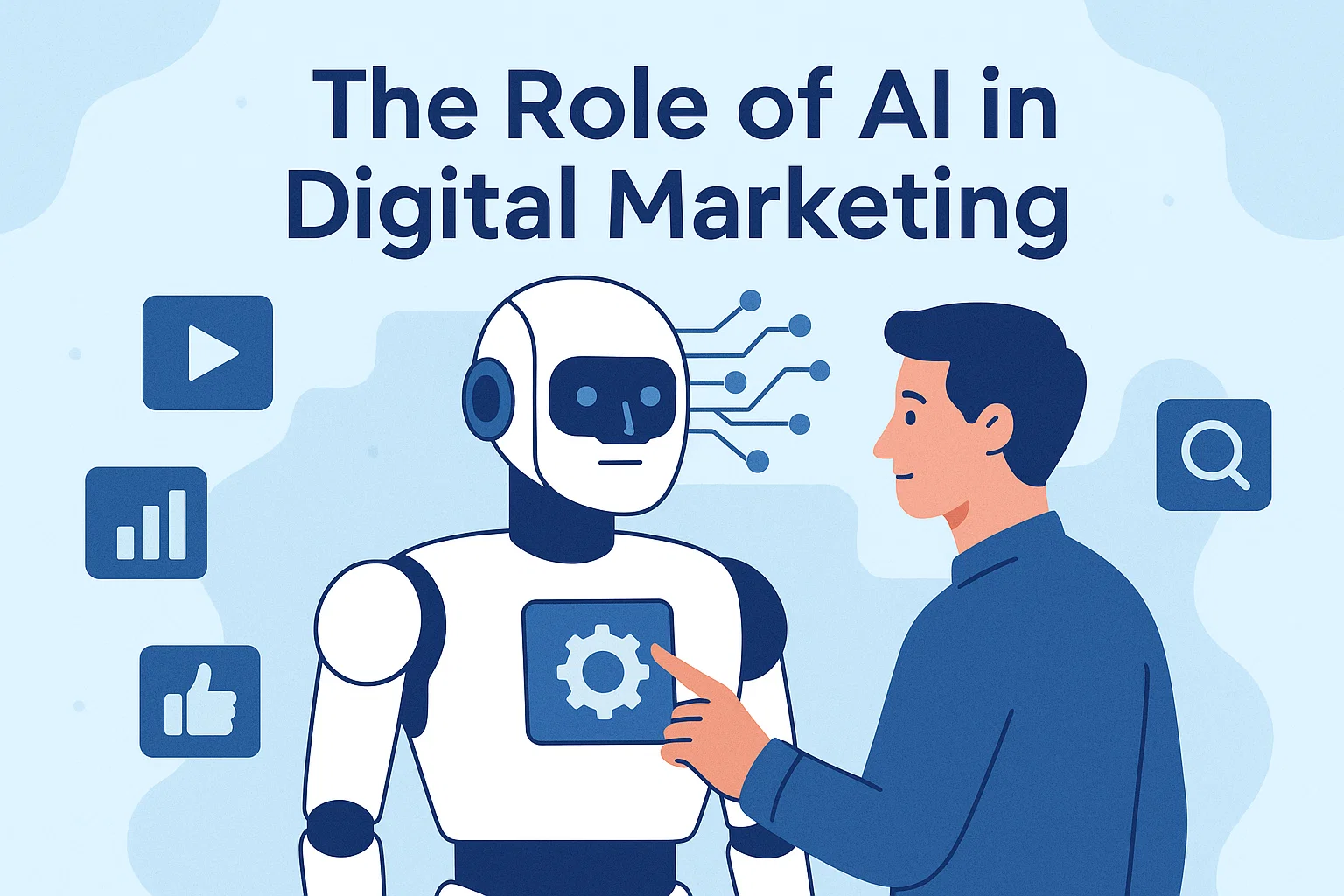In the fast-paced world of digital marketing, staying ahead of trends and leveraging cutting-edge technologies is crucial for success. One of the most transformative technologies to impact the marketing landscape is Artificial Intelligence (AI). From predictive analytics to personalized content, AI is reshaping how businesses interact with their customers. In this blog, we’ll explore how AI in Digital Marketing is revolutionizing customer engagement and why it’s a game-changer for marketers in 2025 and beyond.
What is AI in Digital Marketing?
Artificial Intelligence (AI) in digital marketing refers to the use of machine learning algorithms, predictive analytics, natural language processing, and other AI technologies to optimize marketing efforts. AI helps businesses automate processes, improve decision-making, and provide personalized customer experiences. In a digital marketing context, AI assists in customer engagement by providing actionable insights, automating tasks, and creating highly tailored content and experiences.
1. Personalization at Scale
Personalization has always been a key element of effective marketing. However, creating tailored experiences for each customer manually can be time-consuming and resource-intensive. This is where AI steps in. AI algorithms analyze vast amounts of customer data, such as browsing history, past purchases, and engagement behavior, to deliver hyper-personalized content and product recommendations.
- Personalized Content: AI can help marketers deliver highly personalized emails, ads, and website experiences based on user behavior and preferences.
- Product Recommendations: E-commerce platforms like Amazon use AI-driven recommendation engines to suggest products based on a customer’s past behavior and interactions.
Impact: This level of personalization improves customer satisfaction, drives conversions, and builds stronger customer loyalty. By offering relevant products and services, AI helps businesses engage customers more effectively.
2. Chatbots and Conversational Marketing
AI-powered chatbots are changing the way businesses interact with their customers. These AI-driven assistants can engage in real-time conversations, answer questions, guide customers through the sales funnel, and even handle customer support tasks.
- Instant Customer Service: Chatbots can provide 24/7 support, ensuring customers can always get answers to their questions, even outside of business hours.
- Lead Qualification: Chatbots can qualify leads by asking relevant questions and directing them to appropriate products or services. They can also collect data that can be used for future marketing efforts.
Impact: AI chatbots improve customer engagement by providing immediate, efficient responses to customer inquiries. This leads to increased customer satisfaction, reduced bounce rates, and higher conversion rates.
3. Predictive Analytics for Smarter Engagement
AI-powered predictive analytics helps businesses anticipate customer behavior and tailor their marketing strategies accordingly. By analyzing historical data and customer behavior, AI can forecast what actions a customer is likely to take next—whether it’s making a purchase, abandoning a cart, or engaging with content.
- Predictive Lead Scoring: Marketers can use AI to score leads based on their likelihood of converting, allowing businesses to focus their efforts on high-value prospects.
- Churn Prediction: AI can analyze customer behavior to predict which customers are at risk of leaving and trigger retention strategies to keep them engaged.
Impact: Predictive analytics allows businesses to be proactive in their customer engagement strategies. By anticipating customer needs and behaviors, businesses can tailor their outreach and provide timely, relevant content.
4. Dynamic Content Creation and Optimization
Creating relevant, high-quality content is crucial for engaging customers. AI is revolutionizing content creation by helping marketers produce optimized, personalized content that resonates with their audience. AI tools can generate text, images, and even videos based on customer preferences and trends.
- AI-Generated Content: Tools like natural language generation (NLG) can help marketers generate product descriptions, blog posts, and social media captions. This allows businesses to scale their content production efficiently.
- Content Optimization: AI tools analyze customer interactions and engagement metrics to suggest improvements to existing content, such as headline changes, content structure, or call-to-action optimization.
Impact: AI-powered content creation and optimization ensure that businesses are delivering the right message at the right time. By automating content generation and fine-tuning it based on data, AI improves customer engagement and boosts content performance.
5. AI in Social Media Marketing
Social media platforms are a goldmine for customer engagement, but managing social media marketing manually can be overwhelming. AI can help businesses optimize their social media marketing efforts by analyzing trends, monitoring brand sentiment, and automating posts.
- Social Listening: AI tools can monitor social media platforms for brand mentions, customer feedback, and trending topics, providing valuable insights into how customers perceive your brand.
- Automated Social Media Campaigns: AI can schedule posts, tailor content for specific demographics, and even suggest the best times to post based on engagement patterns.
Impact: AI enhances social media marketing by providing deeper insights into customer sentiment, optimizing content delivery, and automating tedious tasks. This results in better engagement, higher brand awareness, and more effective social campaigns.
6. Enhanced Customer Insights through Data
AI’s ability to analyze large volumes of data is one of its most powerful applications in digital marketing. With AI, businesses can gain deeper insights into customer behavior, preferences, and buying patterns. This data can be used to refine marketing strategies and improve customer engagement efforts.
- Customer Segmentation: AI can segment your audience based on demographic, psychographic, and behavioral data, allowing for more targeted campaigns.
- Behavioral Analytics: AI can track customer actions across various platforms, providing a comprehensive view of the customer journey and helping marketers optimize touchpoints along the way.
Impact: By gaining a better understanding of their customers, businesses can craft more relevant and engaging marketing campaigns, ultimately leading to better customer engagement and higher conversion rates.
7. AI for Email Marketing Optimization
Email marketing remains one of the most effective channels for customer engagement, and AI is taking it to the next level. AI can optimize every aspect of email marketing, from segmentation and content creation to delivery timing.
- Personalized Email Campaigns: AI can analyze customer behavior to send personalized emails with tailored content, product recommendations, and offers.
- Optimal Send Time: AI can determine the best time to send emails based on individual customer habits, improving open rates and engagement.
- A/B Testing: AI can automatically conduct A/B tests to optimize subject lines, email design, and content for maximum engagement.
Impact: AI-powered email marketing ensures that businesses can send highly personalized and timely emails that resonate with customers, leading to improved engagement, higher click-through rates, and increased conversions.
Conclusion: AI is the Future of Customer Engagement in Digital Marketing
Artificial Intelligence is no longer just a buzzword—it’s transforming the way businesses engage with customers. From personalized content and product recommendations to predictive analytics and AI-driven chatbots, AI is revolutionizing how businesses create meaningful connections with their customers. As AI continues to evolve, digital marketers will have more tools at their disposal to create highly tailored, data-driven strategies that enhance customer engagement and drive growth.
At Speed Dot 360, we specialize in harnessing the power of AI to improve digital marketing strategies, automate processes, and deliver exceptional customer experiences. By integrating AI into your digital marketing efforts, you can stay ahead of the competition and build lasting relationships with your customers.
FAQS
Q1: How does AI personalize customer engagement?
AI personalizes customer engagement by analyzing data such as browsing behavior, purchase history, and demographics to deliver tailored content, recommendations, and offers.
Q2: What is predictive analytics, and how does it help digital marketing?
Predictive analytics uses AI to analyze customer data and predict future behaviors, such as when a customer is likely to make a purchase. This helps businesses target customers with relevant content and offers at the right time.
Q3: How can AI improve social media marketing?
AI improves social media marketing by automating tasks like post scheduling, monitoring brand sentiment, analyzing trends, and targeting the right audience with optimized content.
Q4: What role does AI play in email marketing?
AI optimizes email marketing by personalizing campaigns, determining the best send times, and conducting A/B testing to improve open rates, click-through rates, and conversions.
Q5: Can AI really replace human marketers?
While AI can automate many tasks and enhance customer engagement, human marketers are still essential for strategic decision-making, creativity, and emotional intelligence in marketing campaigns.





